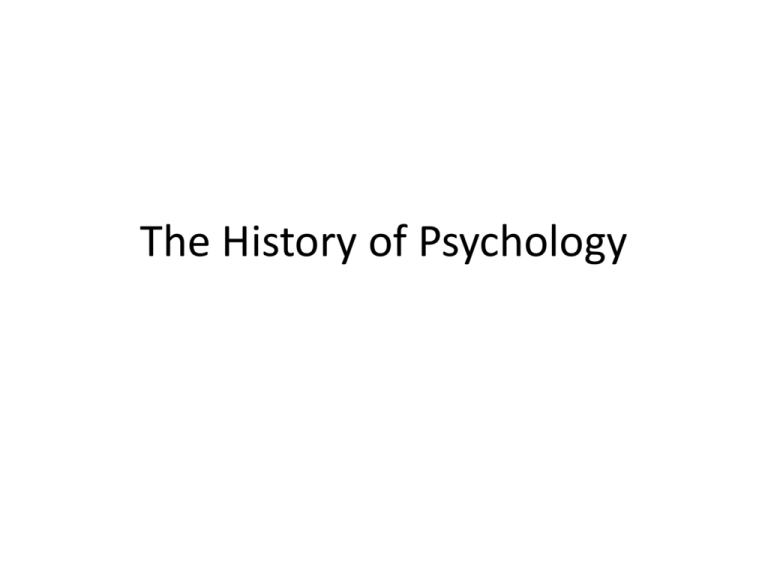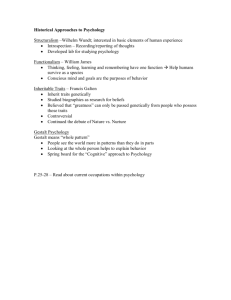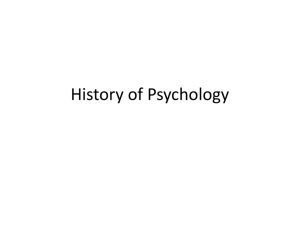The History of Psychology - American Studies II Part A
advertisement

The History of Psychology Ancient Greece • Advice: “Know thyself”, which has remained a motto of psychology ever since. • Introspection: careful examination of one’s own thoughts and emotions-to achieve self knowledge. – “looking within” Middle Ages • Belief in demons (not understanding mental illness) • Certain “tests” used to determine whether one was possessed by a demon. • Ex. Throwing someone in deep water. If they floated to the top, clearly they were impure and possessed. They were executed for associating with the Devil. Late 1800’s • Psychology develops as a laboratory science. • Most historians use the year 1879, as the debut of modern psychology as a laboratory science because that is when Wilhelm Wundt established the first psychological laboratory in Germany. Wilhelm Wundt • “Father of Psychology” • Used introspection to try to discover the basic elements of experience. • Founded, along with his students, Structuralism. Structuralism • A school of psychology. • Focus of study was the basic elements of the mind. • Belief that every experience could be broken down into its basic elements. • Used introspection to carefully examine their experiences. • A dominant force in the early days of psychology, but eventually died out in the early 1900s. • Structuralists would be interested in all of the memories and sensations this woman is experiencing as she smells the flower. Structuralism-Conscious mental experience • Ex. Even though these children experience the same sensations (sweetness and coldness) as they enjoy eating their ice cream, their reported introspections (looking inward to examine one’s own conscious experience) of the experience would probably differ. William James • • • • Late 1800’s 1st American Psychologist Wrote 1st Psychology Textbook in 1890. Focused on relation between conscious experience and behavior. • The stream of consciousness is fluid and continuous. • Founded Functionalism Functionalism • A School of Psychology • Focuses on behavior in addition to the mind or consciousness. • Look at how our experiences helps us function more adaptively in our environments. (How people work, play, and adapt to their surroundings) • Direct observation in a laboratory supplements introspection. Functionalism continued.. • Wanted to understand behavior in terms of its function in our lives. • He was influenced by Darwin’s theories, but instead of looking at physical features like why we stand upright, James focused on behavioral features like why people experience jealousy. • Structuralism and Functionalism Explained (5:22) John B. Watson • Founder of American Behaviorism early 1900’s • Believed psychology must limit itself to observable, measurable events. • Based his work on Pavlov. • Believed that all behavior is learned • “Little Albert” story *see Youtube clip Behaviorism • School of Psychology that focuses on the learning and effects of observable behavior and studies relationships between stimuli and responses. • From the 1920s to the 1960s, Behaviorism was the dominant force in American Psychology. B.F. Skinner-Behaviorist • Major Modern contributor to Behaviorism • Believed in Reinforcement: When a behavior is increased by a stimulus. • Example: train rats to push toys across the floor by giving them rewards of food. • See youtube clip: pigeons Gestalt Psychology 1920s-30s (gih-SHTALT) • School of Psychology that emphasizes the tendency to organize perceptions into wholes and to integrate separate stimuli into meaningful patterns. • We tend to perceive separate pieces of information as integrated wholes, depending on the contexts in which they occur. • People naturally seek out patterns Gestalt continued.. • Much learning, especially in problem solving, is accomplished by insight, not be mechanical repetition. • The next 5 slides have pictures. What do YOU see first? Sigmund Freud • Psychoanalysis, a school of psychology that emphasizes the importance of unconscious motives and conflicts as determinants of human behavior. • Based on the idea that much of our lives are governed by or limited by unconscious ideas and impulses that have their origins in childhood conflicts. Psychoanalysis continued. • Freud came to believe that unconscious processes, especially sexual and aggressive impulses, are more influential than conscious thought in determining human behavior. • Believed that repressed urges, in trying to surface, create nervous disorders. • He relied on personal observation and reflection instead of controlled laboratory experimentation. (NOT scientific) • Human mental life is like an iceberg. The smallest, visible part of the iceberg represents the conscious mental experience of the individual. But underwater, hidden from view, floats a vast store of unconscious impulses, wished, and desires.






